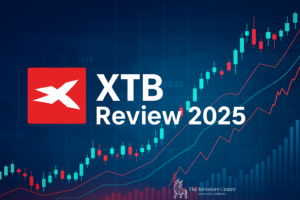
- expertise:
- CFD Trading, Forex, Derivatives, Risk Management
- credentials:
- Chartered ACII (2018) · Trading since 2012
- tested:
- 40+ forex & CFD platforms with live accounts

- expertise:
- Platform Testing, Cryptocurrency, Retail Investing
- credentials:
- Active investor since 2013 · 11+ years experience
- tested:
- 50+ platforms · 200+ guides authored

- expertise:
- Broker Comparison, ISA Strategy, Portfolio Management
- credentials:
- Active investor since 2013 · 11+ years experience
- tested:
- 40+ brokers with funded accounts

- expertise:
- CFD Trading, Forex, Derivatives, Risk Management
- credentials:
- Chartered ACII (2018) · Trading since 2012
- tested:
- 40+ forex & CFD platforms with live accounts

- expertise:
- Platform Testing, Cryptocurrency, Retail Investing
- credentials:
- Active investor since 2013 · 11+ years experience
- tested:
- 50+ platforms · 200+ guides authored

- expertise:
- Broker Comparison, ISA Strategy, Portfolio Management
- credentials:
- Active investor since 2013 · 11+ years experience
- tested:
- 40+ brokers with funded accounts
How We Test
Real accounts. Real money. Real trades. No demo accounts or press releases.
What we measure:
- Spreads vs advertised rates
- Execution speed and slippage
- Hidden fees (overnight, withdrawal, conversion)
- Actual withdrawal times
Scoring:
Fees (25%) · Platform (20%) · Assets (15%) · Mobile (15%) · Tools (10%) · Support (10%) · Regulation (5%)
Regulatory checks:
FCA Register verification · FSCS protection
Testing team:
Adam Woodhead (investing since 2013), Thomas Drury (Chartered ACII, 2018), Dom Farnell (investing since 2013) — 50+ platforms with funded accounts
Quarterly reviews · Corrections: [email protected]
Disclaimer
Not financial advice. Educational content only. We're not FCA authorised. Consult a qualified advisor before investing.
Capital at risk. Investments can fall. Past performance doesn't guarantee future results.
CFD warning. 67-84% of retail accounts lose money trading CFDs. High risk due to leverage.
Contact: [email protected]
In this review, I’ll walk you through everything you need to know about XTB, from fees and features to trading tools and real user experience. Whether you’re brand new to trading or a seasoned pro, this review will help you decide if XTB is the right fit for your trading and finance goals in 2025.
Quick Answer: Would we recommend XTB?
Featured Exchange – XTB
XTB is a trusted global broker that offers a robust trading experience across forex, indices, commodities, and more—all through its award-winning xStation platform. The broker delivers competitive spreads, fast execution, and a comprehensive suite of educational resources, making it a top choice for UK traders seeking exposure to a wide range of markets. With no minimum deposit and strong oversight from the FCA, XTB is well-suited to those who value flexibility, speed, and learning support in their trading journey.
- Minimum Deposit: £0 (start trading with any amount)
- Access crypto CFDs with tight spreads and fast execution
- FCA regulated and fully compliant with UK trading standards
- xStation 5 platform offers powerful tools and market insights
- Great for traders who want a low-barrier, all-in-one CFD platform
71% of retail investor accounts lose money when trading CFDs with this provider. You should consider whether you can afford to take the high risk of losing your money.
What Is XTB?
| Asset Class | Number of Instruments |
|---|---|
| Stocks | 6,093+ |
| ETFs | 1,420+ |
| Forex Pairs | 69+ |
| Commodities | 27+ |
| Indices | 25+ |
| Stock CFDs | 2,177+ |
| ETF CFDs | 218+ |
What Does XTB Do Best?
In my experience, XTB really shines when it comes to low-cost day trading. You can trade stocks and ETFs commission-free for volumes up to £85,000 a month, which is great if you’re trying to keep fees down. It’s also one of the most beginner-friendly platforms I’ve used, thanks to its top-notch educational resources. And the xStation 5 platform? It’s smooth, intuitive, and packed with powerful tools.
What Makes XTB Different?
What Account Types Does XTB Offer?
When I signed up with XTB, I started with their Standard account—it’s their most popular option, and there are no opening or maintenance fees. If you’re just testing the waters, the 30-day demo account is excellent for getting hands-on experience without risking real money.
For more experienced traders, there’s the Pro account, which offers tighter spreads and higher leverage—but you’ll need to meet certain criteria to qualify. And recently, XTB has begun offering a Stocks and Shares ISA for UK investors, so if you’re looking for tax-efficient investing, you’re in the right place.
What Are the Pros and Cons of XTB?
| Pros | Cons |
|---|---|
| Commission-free trading on stocks and ETFs up to £100K per month | No SIPP option for UK investors |
| Easy-to-use, customisable xStation 5 platform | Focus is mainly on CFDs—not ideal for long-term, buy-and-hold investors |
| Excellent educational content, including webinars and tutorials | £10 monthly inactivity fee after 12 months of no trading |
| Competitive interest rates on idle cash | |
| Fast, hassle-free account setup with no minimum deposit |
What Assets Can You Trade on XTB?
There are now over 10,900 instruments available on XTB, covering everything from forex and indices to commodities, stocks, and ETFs. The platform lists more than 6,000 stocks from 16 global exchanges—including major names from the London Stock Exchange and the New York Stock Exchange. Plus, fractional share trading is available, so you can invest in high-priced stocks like Tesla or Netflix without needing to commit the full amount.
That said, if you’re looking for mutual funds or bonds, XTB may feel a bit limited. The platform is best suited to active traders and those pursuing short- to medium-term strategies.
| Fee Type | Details |
|---|---|
| Minimum Deposit | No minimum deposit required. |
| Inactivity Fee | £10 per month after 12 months of inactivity. |
| Stock and ETF Trading (UK & US) | £0 commission for trades up to £85,000 per month. |
| Forex Trading | Spread-based fees, starting from 0.3 pips for major currency pairs like EUR/USD. |
| Withdrawal Fee | No withdrawal fees. |
| Credit/Debit Card Deposit Fees | £0 for most regions, up to 2% for certain countries. |
| Currency Conversion Fee | 0.5% applied on transactions involving a currency different from the account’s base currency. |
| Leverage Costs | Variable, based on the asset and account type. Overnight financing costs apply (e.g., -0.02341% for equity CFDs). |
| Interest on Uninvested Funds | 4.5% for GBP, 4.2% for USD, 2.3% for EUR (rates subject to change). Applies only to the free margin available on the account. |
What Are the Fees Like on XTB?
One of the biggest reasons I started using XTB was its low-cost structure. If you’re trading stocks and ETFs, you can go commission-free on up to £85,000 in trades per month—which is seriously competitive. Once you pass that limit, there’s a 0.2% commission, with a minimum fee of £10 per trade. Still reasonable in my book.
If you’re into trading forex, you’ll find. Spreads on major pairs like EUR/USD start from just 0.8 pips. Plus, there are no separate commissions since the fees are baked into the spread. It keeps things simple and transparent.
Does XTB charge Withdrawal fees?
With XTB, withdrawals are now completely free of charge, regardless of the amount. This is great news for traders who move money in and out frequently, as it adds even more flexibility and cost savings.
Who should trade with XTB?
This platform is a great fit for traders who want low fees and solid trading tools all in one place.
If you’re just starting out, their educational content makes the learning curve a lot smoother. If you’re more experienced, the xStation 5 platform gives you advanced features that make analysis and execution seamless. The commission-free trading is especially appealing if you’re managing a smaller portfolio or trading regularly.
That said, if you’re a long-term investor looking for a Self-Invested Personal Pension (SIPP), XTB might fall short.
What Are the Fees Like on XTB?
The xStation 5 platform is where XTB shines for me. It has advanced charting tools, live market sentiment, risk management features, and even an integrated stock screener. I also like the real-time news and economic calendar—I find them especially useful for staying on top of market-moving events.
Another handy feature is their post-trade analysis tool. It breaks down your trading performance so you can spot patterns and improve your strategy over time. You’ve also got access to standard order types—market, limit, stop—giving you flexibility with how and when you enter or exit trades.
Can You Trade with Leverage?
Yes, and I’ve found XTB’s leverage offerings pretty competitive. For forex, retail traders can access leverage up to 30:1, depending on your region’s regulations. It’s a useful tool if you know how to manage risk, but be careful—leverage can boost your profits, but it can also magnify your losses just as fast.
Are my funds safe with XTB?
Security is a big deal for me, and it’s one of the reasons I trust XTB. They are closely monitored by the FCA in the UK, which means they have agreed to follow a strict set of rules designed to keep your money and data safe.
All transactions are protected with SSL encryption, and client funds are held in segregated accounts. Plus, if something ever went seriously wrong, UK clients are covered by the Financial Services Compensation Scheme (FSCS), which protects up to £85,000. That kind of peace of mind goes a long way when you’re trading online.
Does XTB Offer Any Educational Tools and Resources?
Absolutely—and this is one of the things I like most about XTB. They offer a solid lineup of educational content that’s actually useful, whether you’re just starting out or already have some experience.
I began with their “Trading Basics” course, which helped me get a handle on the fundamentals. Then I moved on to their more advanced stuff, like the “Trading Masterclass” and expert-led webinars on risk management and technical analysis.
They’re constantly updating the material too, with fresh insights and market analysis, so it’s easy to stay informed and keep learning.
Final Thoughts on XTB
After using XTB extensively, I’d say it’s one of the better all-round platforms out there. The low fees, commission-free trading, stocks and shares ISA and the clean, powerful platform tick all the right boxes for me. It’s also packed with a bunch of helpful educational tools, which makes it especially beginner-friendly.
That said, the lack SIPP accounts is a bit of a letdown if you’re a UK investor focused on tax efficiency. But overall, XTB delivers on security, cost-effectiveness, and unique trading features, making it a great choice for both new and seasoned traders alike.
Featured Broker
- Easy Account Set Up
- Interest On Univested Funds
- Educational Tools
- Easy To Use Platform
71% of retail investor accounts lose money when trading CFDs with this provider. You should consider whether you can afford to take the high risk of losing your money.
FAQs
Can I use XTB’s app trading?
Yes,XTB’s app is smooth and user-friendly. It’s packed with key features which makes it perfect for trading on the go.
Is the xStation 5 platform any good?
Absolutely. xStation 5 is one of the better platforms I’ve used. It’s intuitive enough for beginners but still offers depth. It’s fast, reliable, and genuinely feels like a professional-grade tool.
Is XTB good for forex trading?
Yes, XTB is a solid pick for forex. You get tight spreads starting from 0.8 pips and access to a wide range of currency pairs, plus leverage up to 30:1 if you’re a retail trader. I also appreciate their educational content—it’s especially helpful for building out a solid forex strategy.
Is XTB regulated in the UK?
Yes, XTB is fully supervised and monitored by the FCA, which is one of the most respected financial regulators globally.
Is XTB a good broker overall?
I’d say so. Between the low costs, powerful tools, and great education, it’s hard to go wrong—especially if you’re focused on active trading.
What’s the minimum deposit at XTB?
There isn’t one! That’s a big win for beginners or anyone who wants to start small. You can fund your account with whatever amount you’re comfortable with.
Is XTB good for beginners?
Definitely. The platform is easy to use, the demo account is super helpful, and the educational resources are some of the best I’ve come across. If you’re new to trading, XTB is a great place to start.
References
- XTB Official Website – XTB – Investing, Savings, Trading | XTB
- Financial Conduct Authority (FCA) Register – Find XTB on the FCA Register
- Warsaw Stock Exchange (WSE) – Główny Rynek GPW – Główny Rynek
- Trustpilot – XTB User Reviews
- XTB Demo Account – Open free demo account CFDs in Forex
- XTB Learning Resources – Knowledge Base










